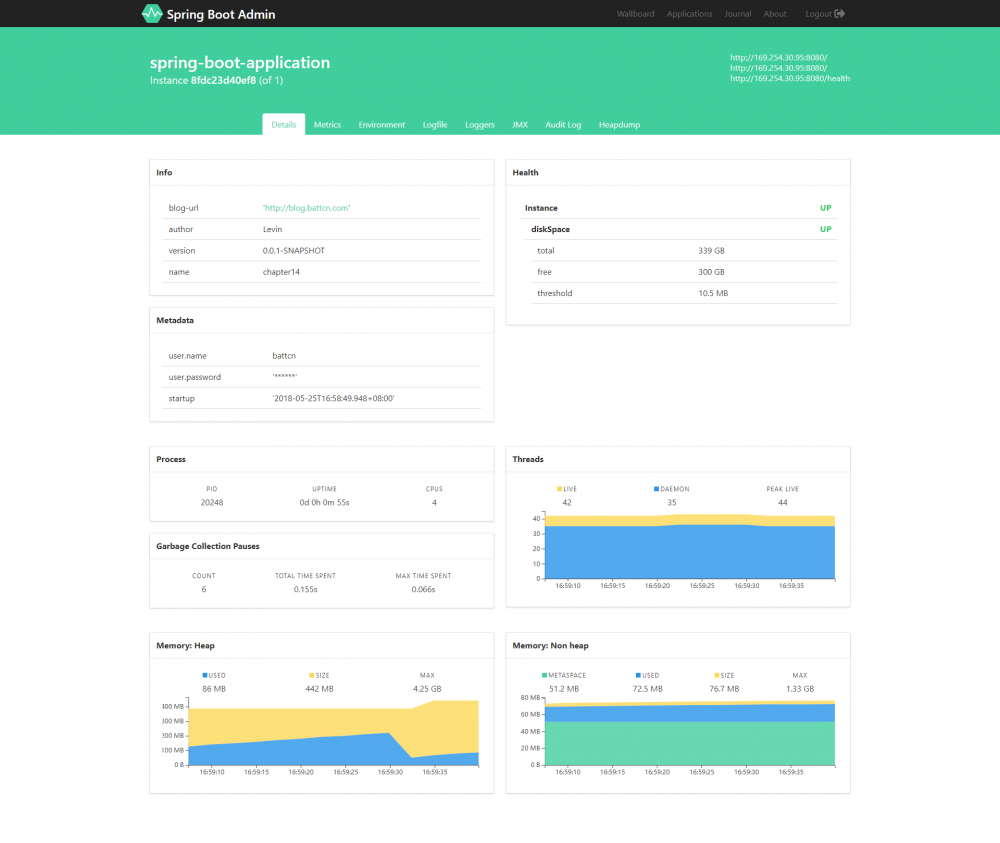一起来学SpringBoot | 第十五篇:actuator与spring-boot-admin 可以说的秘密
SpringBoot 是为了简化 Spring 应用的创建、运行、调试、部署等一系列问题而诞生的产物, 自动装配的特性让我们可以更好的关注业务本身而不是外部的XML配置,我们只需遵循规范,引入相关的依赖就可以轻易的搭建出一个 WEB 工程
一起来学SpringBoot | 第十四篇:强大的 actuator 服务监控与管理 中介绍了 actuator 的作用,细心的朋友可能会发现通过 http restful api 的方式查看信息过于繁琐也不够直观,效率低下,运维人员看到JSON数据更是一脸懵逼,当服务过多的时候查看起来就过于操蛋了,每个服务都需要调用不同的接口来查看监控信息,备受各种困扰因素的我默默翻了下 全球最大男性交友平台 找到了 spring-boot-admin
什么是SBA
SBA 全称 Spring Boot Admin 是一个管理和监控 Spring Boot 应用程序的开源项目。分为 admin-server 与 admin-client 两个组件, admin-server 通过采集 actuator 端点数据,显示在 spring-boot-admin-ui 上,已知的端点几乎都有进行采集,通过 spring-boot-admin 可以动态切换日志级别、导出日志、导出 heapdump 、监控各项指标 等等….
Spring Boot Admin 在对单一应用服务监控的同时也提供了集群监控方案,支持通过 eureka 、 consul 、 zookeeper 等注册中心的方式实现多服务监控与管理…
导入依赖
在 pom.xml 中添加 spring-boot-admin 的相关依赖,这里只演示单机版本的,因此就自己监控自己了
<dependencies>
<!-- 服务端:带UI界面 -->
<dependency>
<groupId>de.codecentric</groupId>
<artifactId>spring-boot-admin-starter-server</artifactId>
<version>2.0.0</version>
</dependency>
<!-- 客户端包 -->
<dependency>
<groupId>de.codecentric</groupId>
<artifactId>spring-boot-admin-starter-client</artifactId>
<version>2.0.0</version>
</dependency>
<!-- 安全认证 -->
<dependency>
<groupId>org.springframework.boot</groupId>
<artifactId>spring-boot-starter-security</artifactId>
</dependency>
<!-- 端点 -->
<dependency>
<groupId>org.springframework.boot</groupId>
<artifactId>spring-boot-starter-actuator</artifactId>
</dependency>
<dependency>
<groupId>org.springframework.boot</groupId>
<artifactId>spring-boot-starter-web</artifactId>
</dependency>
<dependency>
<groupId>org.springframework.boot</groupId>
<artifactId>spring-boot-starter-test</artifactId>
<scope>test</scope>
</dependency>
<!-- 在管理界面中与 JMX-beans 进行交互所需要被依赖的 JAR -->
<dependency>
<groupId>org.jolokia</groupId>
<artifactId>jolokia-core</artifactId>
</dependency>
</dependencies>
注意事项
如果要访问 info 接口想获取 maven 中的属性内容请记得添加如下内容
<build>
<plugins>
<plugin>
<groupId>org.springframework.boot</groupId>
<artifactId>spring-boot-maven-plugin</artifactId>
<executions>
<execution>
<goals>
<goal>build-info</goal>
</goals>
</execution>
</executions>
</plugin>
</plugins>
</build>
属性配置
在 application.properties 文件中配置 actuator 的相关配置,其中 info 开头的属性,就是访问 info 端点中显示的相关内容,值得注意的是 Spring Boot2.x 中,默认只开放了 info、health 两个端点,剩余的需要自己通过配置 management.endpoints.web.exposure.include 属性来加载(有 include 自然就有 exclude ,不做详细概述了)。这个 management.endpoints.web.base-path 属性比较重要,因为 Spring Boot2.x 后每个端点默认的路径是 /actuator/endpointId 这样一来 Spring Boot Admin 是无法正常采集的
application.properties
# 描述信息 info.blog-url=http://blog.battcn.com info.author=Levin # 如果 Maven 插件没配置此处请注释掉 info.version=@project.version@ info.name=@project.artifactId@ # 选择激活对应环境的配置,如果是dev则代表不用认证就能访问监控页,prod代表需要认证 spring.profiles.active=prod # 日志文件 logging.file=./target/admin-server.log # 加载所有的端点/默认只加载了 info / health management.endpoints.web.exposure.include=* # 比较重要,默认 /actuator spring-boot-admin 扫描不到 management.endpoints.web.base-path=/ management.endpoint.health.show-details=always spring.boot.admin.client.url=http://localhost:8080 # 不配置老喜欢用主机名,看着不舒服.... spring.boot.admin.client.instance.prefer-ip=true
application-dev.properties - 空
application-prod.properties
为了安全起见,应采用认证的方式
# 登陆所需的账号密码 spring.security.user.name=battcn spring.security.user.password=battcn # 便于客户端可以在受保护的服务器上注册api spring.boot.admin.client.username=battcn spring.boot.admin.client.password=battcn # 便服务器可以访问受保护的客户端端点 spring.boot.admin.client.instance.metadata.user.name=battcn spring.boot.admin.client.instance.metadata.user.password=battcn
主函数
添加上 @EnableAdminServer 注解即代表是 Server 端,集成UI的
package com.battcn;
import de.codecentric.boot.admin.server.config.AdminServerProperties;
import de.codecentric.boot.admin.server.config.EnableAdminServer;
import org.springframework.boot.SpringApplication;
import org.springframework.boot.autoconfigure.SpringBootApplication;
import org.springframework.context.annotation.Configuration;
import org.springframework.context.annotation.Profile;
import org.springframework.security.config.annotation.web.builders.HttpSecurity;
import org.springframework.security.config.annotation.web.configuration.WebSecurityConfigurerAdapter;
import org.springframework.security.web.authentication.SavedRequestAwareAuthenticationSuccessHandler;
/**
* @author Levin
*/
@SpringBootApplication
@EnableAdminServer
public class Chapter14Application {
public static void main(String[] args) {
SpringApplication.run(Chapter14Application.class, args);
}
/**
* dev 环境加载
*/
@Profile("dev")
@Configuration
public static class SecurityPermitAllConfig extends WebSecurityConfigurerAdapter {
@Override
protected void configure(HttpSecurity http) throws Exception {
http.authorizeRequests().anyRequest().permitAll()
.and().csrf().disable();
}
}
/**
* prod 环境加载
*/
@Profile("prod")
@Configuration
public static class SecuritySecureConfig extends WebSecurityConfigurerAdapter {
private final String adminContextPath;
public SecuritySecureConfig(AdminServerProperties adminServerProperties) {
this.adminContextPath = adminServerProperties.getContextPath();
}
@Override
protected void configure(HttpSecurity http) throws Exception {
SavedRequestAwareAuthenticationSuccessHandler successHandler = new SavedRequestAwareAuthenticationSuccessHandler();
successHandler.setTargetUrlParameter("redirectTo");
http.authorizeRequests()
.antMatchers(adminContextPath + "/assets/**").permitAll()
.antMatchers(adminContextPath + "/login").permitAll()
.anyRequest().authenticated()
.and()
.formLogin().loginPage(adminContextPath + "/login").successHandler(successHandler).and()
.logout().logoutUrl(adminContextPath + "/logout").and()
.httpBasic().and()
.csrf().disable();
}
}
}
测试
完成准备事项后,启动 Chapter14Application 访问 http://localhost:8080/login 看到登陆页面则代表一切正常,接着输入账号密码点击登陆即可…

由于篇幅原因大图就不放太多了,有兴趣的朋友可以直接 fork 代码运行即可
总结
参考文档: http://codecentric.github.io/spring-boot-admin/2.0.0/
目前很多大佬都写过关于 SpringBoot 的教程了,如有雷同,请多多包涵,本教程基于最新的 spring-boot-starter-parent:2.0.2.RELEASE 编写,包括新版本的特性都会一起介绍…
- 本文标签: 开源项目 Spring Boot XML ssh client ip ORM 配置 GitHub dependencies 认证 http tar IDE id json spring build bean zookeeper API consul REST 测试 主机 js 数据 服务端 App rmi 开源 pom Security 安全 RESTful 注册中心 Eureka 服务器 core https 调试 IO 注释 logo 总结 maven Logging 集群 管理 springboot 插件 web src git plugin UI 代码 final authenticate Word cat
- 版权声明: 本文为互联网转载文章,出处已在文章中说明(部分除外)。如果侵权,请联系本站长删除,谢谢。
- 本文海报: 生成海报一 生成海报二











![[HBLOG]公众号](https://www.liuhaihua.cn/img/qrcode_gzh.jpg)

